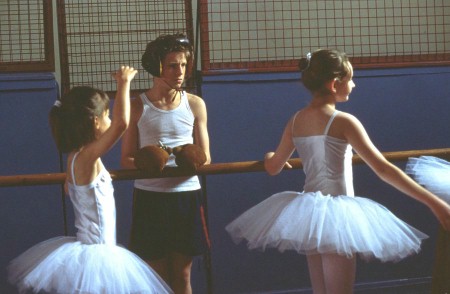Starring Jamie Bell, Julie Walters, Gary Lewis, Jamie Draven, Jean Heywood,
Stuart Wells. Directed by Stephen Daldry.
Billy Elliot (Bell) lives in Durham, a drab coal-mining town in northern England.
His father (Lewis) and brother Tony (Draven) both work in the mines, and they have
just gone on strike, engaging in daily battle with baton and shield-wielding riot
police. His father gives him 50 pence each week to go to the gym and box. The
problem is Billy sucks at it. He notices next door a bunch of young girls learning
ballet, and he joins in. He likes it, to the point he fakes going to boxing, ending
up instead spinning and jumping with the girls. Eventually his embarrassed father
discovers where his hard-earned money is going and he forbids Billy continuing to dance.
But Billy does continue when the ballet instructor Mrs. Wilkinson (Walters) suggests
he try out for the Royal Ballet in London. She and him work hard to prepare him
for his audition, but he misses it because his brother is arrested during strike
violence with police. Will Billy ever realize his dream of going to school to learn
the ballet?
The film starts off well as Billy starts his dancing career. It is high on charm,
with a nice relationship between Billy and his ballet instructor's daughter Debbie,
excellent interplay between Billy and Mrs. Wilkinson, and a sensitive handling of
Billy's friendship with the non-masculine Michael. Like The Full Monty,
the film shows the debilitating effects of Thatcheresque capitalism on union labour
and those workers' families. It shows the contrast between the middle class ballet
instructor's lifestyle, and the effect of infidelity and her husband being declared
"redundant" on Debbie and her, and mildly hints at middle class resentment of labour unions
that divides both groups and prevents them from seeing the similarities in their
insecure workplaces. But soon, plausibility and social commentary go out the window.
The scene
where Billy expresses his anger with his dad and brother for forbidding him to continue
dancing by doing a Stomp style dance routine kicking doors and walking up
and down walls caused me scratch my head a bit. The scene where Billy's dad decides
to break all his principles to scab in the mine just to get enough money to send
Billy to the Royal Ballet, and blubbering Tony hugging
and pleading with his father not to do it made me think to myself COULD YOU MANIPULATE
ME ANYMORE ??? And all-of-a-sudden daddy and big brother are onside and think Billy's
quest to join the ballet must be supported at all costs. The eventual ending is
predictable and milked for all it's worth.
Julie Walters is sensational, elevating every scene she is in. She presents a
world-weary woman bitter about her marriage, but one who see potential in Billy
and wants to fulfill it, partially to satisfy herself. Newcomer Jamie Bell is superb
in both projecting a fierce desire to do something he loves doing despite the disapproval
of just about everybody. The soundtrack is great with such appropriate classics
as T-Rex's Bang-A-Gong, The Jam's Town Called Malice and The Clash's
London Calling. Unfortunately Billy Elliot is not in the same class
as some of the British working-class films such as the Full Monty. It's overly
sentimental, calculated feel-good script lessens the charm and believability of the
film for me. But many reviews for the film have been very good and I suspect many
filmgoers will enjoy the Rocky-like story of a boy going against his family and
town to do what he loves and succeeding against all odds.
  
If you would like to respond, please click the
E-Mail

Press Here To Go To The Review List Page
|









